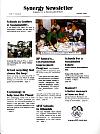

synergy vol 1 issue 2
Window
on the Future...
What I Learned
in the Rainforest
by Tachi
Kiuchi
Part 1
![]()
Stay alert. Watch where you are going.
It seems to me that the global business community is driving quickly toward a cliff, and we have our eyes closed. If we opened them, here is what we would see:
Today, 600 million of the Earth's inhabitants-in Europe, Japan, and the United States - enjoy the material benefits of industrialism.
Soon, 2.5 billion more-China, India, the former Soviet Republics-will join us.
And after them, the final 3 billion will seek the same. They demand and deserve to share in the benefits which we enjoy.
To do that today, we need three planets. But we have only one.
-
We must learn a new way of life.
-
We must learn to provide affluence without effluence.
-
We must develop prosperous human communities, with meaningful work and social equity between various groups.
-
And, we must do so by consuming less from the environment, not more.
Population explosion. Habitat destruction. Resource consumption. Those are signs that may worry us. But as we approach the 21st Century, I wonder if you all see, as I do, positive signs as well, signs of the dawn of an entirely new era, an era when all our businesses, yours and mine, will undergo dramatic change.
That new era could move us beyond the industrial era, where we used machines to expand human muscle. It could carry us into a new era where we expand the human mind.
To excel in this new era, Mitsubishi Electric Corporation has developed a longrange business plan. We call it Vision 21. Vision 21 challenges us to excel in several emerging business domains, all based on the use, not of raw materials and fossil fuels, but knowledge. For example:
- We make some of the world's most efficient solar cells.
- We make fuel cells that turn simple hydrogen to electricity, with no pollution.
- We make microchips for companies like Hewlett-Packard and Sun.
- We introduced the world's first CFC-free refrigerator, and won the US Environmental Protection Agency's award for our innovation.
- We design and engineer technologies of the Internet, that allow us to communicate without paper, to travel without going anywhere.
- We make the satellite systems that can continuously monitor the global environment, and feed that information back to nations, businesses, and people who can take action in response.
Through Vision 21, we are shifting our investments away from the ecologically harmful practices of the old economy,
toward the information-based technologies of the future. We are shifting from growth based on consumption to growth based on knowledge.
The pace of change, however, is extremely fast. To succeed, we must be agile. And we must be creative. And that requires that we operate our businesses in bold new ways.
In the old days, we operated our businesses like they were machines. But machines are not agile. They are not creative. They do not respond well to change.
In the future, we need to operate our businesses according to a different model.
That brings me to how I got my second lesson from the forest.
Around Earth Day five years ago, I received a small stack of letters from a class of elementary school students, asking me to do what I could to stop harming the rainforest.
The letters confused me at first. We are an electronics company. We have no timber holdings. We make no forest products. We use very little paper or wood. What's the connection?
It turned out they were talking about another company that shares the Mitsubishi name. We've been separate companies for 50 years, since 1946. Not subsidiaries, not divisions. Separate. But no one knows this except us. Everyone thinks they own us, or we own them, or somebody else owns us all.
So long ago, we stopped trying to convince people we are separate companies. It's much easier just to try to do something about the problem, instead of worrying about the name confusion.
Solving problems and fulfilling needs, after all, is how businesses discover new markets, and generate new profits. It's even better if the company isn't invested in whatever caused the problem-so there's no trapped capital to lose.
So, on my next trip to Asia, I visited the Malaysian rainforest. I met with expert foresters. I visited timber cutting sites, as well as reforesting and research operations. I spoke with visionary environmentalists and executives. What I learned changed my life as a corporate executive.
![]()
SFSF
Schools For a Sustainable Future

1 Curdies St.
E. Bentleigh Vic. 3165
Email:
Joe Natoli
Ph: (03) 9579-7224 Fax:
(03) 9579-6153 Mobile: 0411-568-523
Website
designed & maintained by
